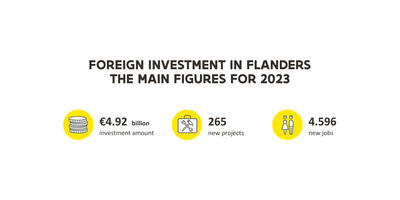
Why Flanders is a vaccine development and production hub

Breakthroughs in research for a COVID-19 vaccine
Belgium has attracted a large number of major pharmaceutical firms, such as Pfizer (US), GSK (UK), world leader in vaccine development and manufacturing and Johnson & Johnson (US), parent company of Flanders-based Janssen Pharmaceutica. These companies are currently involved in the search for a vaccine against COVID-19, and several have already made significant progress.
In collaboration with immunotherapy company BioNTech, Pfizer is working on four coronavirus vaccine candidates. The clinical trials for these vaccines have already been approved in Germany and the US. If one of the candidates is proven effective, Pfizer’s manufacturing site in Puurs (Flanders) will be one of the four main centers to produce the vaccine. Furthermore, Johnson & Johnson has also reached a breakthrough in the search for a COVID-19 vaccine. Its Flanders subsidiary, Janssen Pharmaceutica, developed a viable vaccine candidate in March. The company hopes to start production before the end of 2020.
Other pharma players working on COVID-19 in Flanders include Ziphius Therapeutics and Etherna Immunotherapies. Biotech firm Ziphius is building on the expertise of UGent, one of Flanders’ five universities, to develop a vaccine candidate which can be administered through the nose. At the moment, research is still at an early stage, but the firm expects to start clinical trials in fall 2020. Etherna Immunotherapies, is also working on a nasal vaccine with the help of VUB, one of Flanders’ universities. The company is part of a consortium of European and North American firms. While development is still in the lab phase, the goal is to start testing in early 2021.
Meanwhile, at the Rega Institute for Medical Research – which is part of KU Leuven, Flanders’ oldest university –, a vaccine prototype is ready for animal testing. At the same time, the research center is screening components of existing medicines for properties that may inhibit the coronavirus.
A quarter of all vaccine trials
But Belgium’s and Flanders’ international COVID-19 pharma track record doesn’t end there… In fact, according to Pharma.be, the pharmaceutical industry’s sector federation, Belgium accounts for almost a quarter of all vaccine candidate clinical trials in Europe.
Flanders has several hospital centers that are specialized in testing potential vaccines on human volunteers, such as Luvac (Leuven Center for Vaccinology) and Cevac (Ghent Center for Vaccinology). Moreover, the CEV in Antwerp (Center for the Evaluation of Vaccination) announced that from 2020 onwards, it will acquire a quarantine unit to test vaccine candidates. In addition, various local hospitals have specific departments for testing medicine candidates and vaccine prototypes.
First worldwide for vaccine production per capita
Belgium and Flanders will play a significant part in the vaccine production stage. “Belgium ranks number one for number of vaccine doses produced per capita,” explains Luc Debruyne, strategic advisor at CEPI, a global institute invested in preventing epidemics. As a result, it is likely that the COVID-19 vaccine will be produced in Belgium, even more when GSK and Pfizer successfully develop an effective vaccine themselves. The companies are already planning to expand their production capacities in the country.
But even if GSK and Pfizer do not succeed in developing a vaccine, it is inevitable that these companies will make agreements to increase as well as share their existing production capacities worldwide. “This is the only way to guarantee the mass availability of vaccines as early as possible,” Debruyne adds. Meanwhile, the CEPI institute is determining which companies can help start up and expand production from the moment a vaccine is approved.
About Belgium and Flanders
With Dutch as its official language, Flanders (Dutch: Vlaanderen) is the autonomous northern region of Belgium. The capital of both Belgium and Flanders is Brussels.


